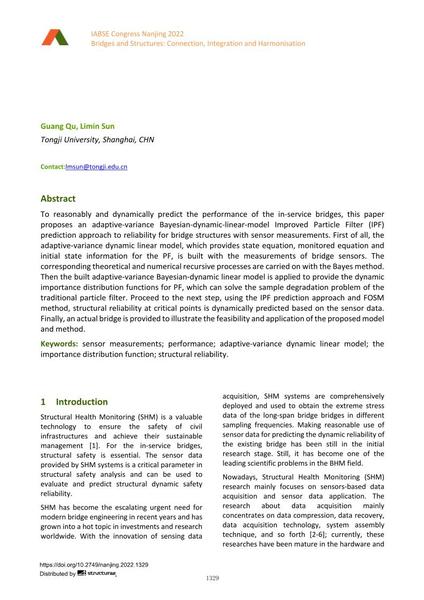Bridge Performance Prediction Approach Based on Improved Particle Filter and Structural Health Monitoring Data

|
|
|||||||||||
Détails bibliographiques
| Auteur(s): |
Guang Qu
(Tongji University, Shanghai, CHN)
Limin Sun |
||||
|---|---|---|---|---|---|
| Médium: | papier de conférence | ||||
| Langue(s): | anglais | ||||
| Conférence: | IABSE Congress: Bridges and Structures: Connection, Integration and Harmonisation, Nanjing, People's Republic of China, 21-23 September 2022 | ||||
| Publié dans: | IABSE Congress Nanjing 2022 | ||||
|
|||||
| Page(s): | 1329-1337 | ||||
| Nombre total de pages (du PDF): | 9 | ||||
| DOI: | 10.2749/nanjing.2022.1329 | ||||
| Abstrait: |
To reasonably and dynamically predict the performance of the in-service bridges, this paper proposes an adaptive-variance Bayesian-dynamic-linear-model Improved Particle Filter (IPF) prediction approach to reliability for bridge structures with sensor measurements. First of all, the adaptive-variance dynamic linear model, which provides state equation, monitored equation and initial state information for the PF, is built with the measurements of bridge sensors. The corresponding theoretical and numerical recursive processes are carried on with the Bayes method. Then the built adaptive-variance Bayesian-dynamic linear model is applied to provide the dynamic importance distribution functions for PF, which can solve the sample degradation problem of the traditional particle filter. Proceed to the next step, using the IPF prediction approach and FOSM method, structural reliability at critical points is dynamically predicted based on the sensor data. Finally, an actual bridge is provided to illustrate the feasibility and application of the proposed model and method. |
||||
| Copyright: | © 2022 International Association for Bridge and Structural Engineering (IABSE) | ||||
| License: | Cette oeuvre ne peut être utilisée sans la permission de l'auteur ou détenteur des droits. |
||||
